

Usages, mésusages. C’est en lisant Paul Ariès (Wikipédia), rédacteur en chef du Sarkophage – notamment La simplicité volontaire contre le mythe de l’abondance -, que j’ai mieux compris les limites qui me chiffonnaient dans la consommation collaborative.
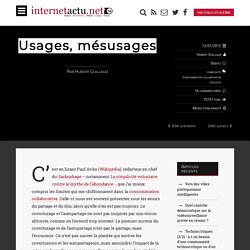
Celle-ci nous est souvent présentée sous les atours du partage et du don, alors qu’elle n’en est pas toujours. Le covoiturage et l’autopartage ne sont pas inspirés par une vision altruiste, comme on l’entend trop souvent. Le premier moteur du covoiturage et de l’autopartage n’est pas le partage, mais l’économie. Ce n’est pas sauver la planète qui motive les covoitureurs et les autopartageurs, mais amoindrir l’impact de la crise sur leurs finances personnelles, comme le soulignait déjà l’étude 2010 de l’Institut d’aménagement et d’urbanisme d’Ile-de-France (.pdf). Les utilisateurs de ces services sont d’abord à la recherche de revenus complémentaires. VIDEO - WHYown.it app brings social borrowing to your friends. WHYown.it has officially launched in the App Store today, making borrowing between friends easier and life a little cheaper.
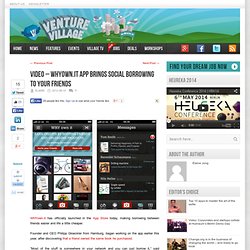
Founder and CEO Philipp Gloeckler from Hamburg, began working on the app earlier this year, after discovering that a friend owned the same book he purchased. “Most of the stuff is somewhere in your network and you can just borrow it,” said Gloeckler, “save money and re-connect with your friends.” On WHYown.it, users upload photos of items they’d lend, and state what they’d like to borrow. Sharing is only done between friends, “there’s sometimes a fear in collaborative consumption. But this way – you only put up stuff for people you know and trust,” said Gloeckler. Watch our video interview with Gloeckler below to find out more… For related posts, check out: Why Millennials Don't Want To Buy Stuff. Compared to previous generations, Millennials seem to have some very different habits that have taken both established companies and small businesses by surprise.
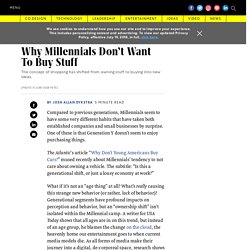
One of these is that Generation Y doesn’t seem to enjoy purchasing things. The Atlantic‘s article “Why Don’t Young Americans Buy Cars?” Mused recently about Millennials’ tendency to not care about owning a vehicle. The subtitle: “Is this a generational shift, or just a lousy economy at work?” What if it’s not an “age thing” at all?
So is technology the culprit, then? And there’s the culprit. Humanity is experiencing an evolution in consciousness. This new attitude toward ownership is occurring everywhere, and once we recognize this change, we can leverage it. A New Form of Competitive Advantage Even in this strange new world, the economic laws of scarcity apply, and they are precisely what’s shifting. The biggest insight we can glean from the death of ownership is about connection. 1. 2. Streaming: 89% of Digital Music Sales in Sweden. If these latest numbers are anything to go by, then downloads could be consigned to the scrapheap alongside CDs, miniDiscs and other music media in the not-too-distant future.
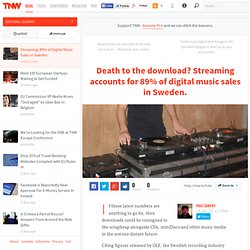
Citing figures released by GLF, the Swedish recording industry association, Music Ally reports that streaming represents 89% of all digital music sales in the Scandinavian country – the spiritual home of Spotify, as it happens. Interestingly, while music sales across all formats rose by almost a third (30.1%) year-on-year in the first half of this year, digital music accounted for almost two-thirds (63.5%) of revenues. So, with streaming representing such a large chunk of the total digital sales, we can probably point the finger at Spotify’s role in helping to buoy the music industry in its home country. Of course there are other streaming services, but Spotify is the clear leader in the space. In the first half of 2012, overall music sales amounted to 446m (SEK), around $63.5m. Access over ownership. Is this the end of ownership? This is a guest post by Tien Tzuo, founder and CEO of cloud-based payment and billings platform Zuora for subscription businesses The way in which we buy and consume products is rapidly changing.
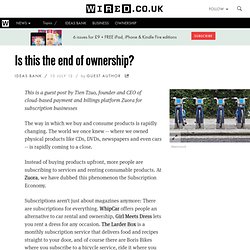
The world we once knew -- where we owned physical products like CDs, DVDs, newspapers and even cars -- is rapidly coming to a close. Instead of buying products upfront, more people are subscribing to services and renting consumable products. At Zuora, we have dubbed this phenomenon the Subscription Economy. Subscriptions aren't just about magazines anymore: There are subscriptions for everything. So how does it work? Think about it like this: when was the last time you bought a CD or DVD? Or how about your business life? And, what about the opportunities this brings? This fundamental shift away from owning a product to the Subscription Economy is unmistakable. So what are the implications? Ideas Bank is a section on Wired.co.uk that houses opinionated guest posts on any "Wired" topic.